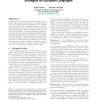Free Online Productivity Tools
i2Speak
i2Symbol
i2OCR
iTex2Img
iWeb2Print
iWeb2Shot
i2Type
iPdf2Split
iPdf2Merge
i2Bopomofo
i2Arabic
i2Style
i2Image
i2PDF
iLatex2Rtf
Sci2ools
SAC
2004
ACM
2004
ACM
The effectiveness of combining information retrieval strategies for European languages
Building an effective Information Retrieval system requires various design choices, ranging from the weighting scheme to the type of morphological normalization. The combination of runs has become a standard technique to reap the benefits of different run types. Until now, systematic studies of the effectiveness of combination strategies have only been carried out for English. This paper provides an exploratory overview of the effectiveness of combination methods in nine European languages. We demonstrate that the combination of effective information retrieval strategies can lead to significant improvements of retrieval effectiveness. Furthermore, we analyze the relative impact of retrieving more relevant documents and of improved ranking of relevant documents. The experimental evidence is obtained using the 2003 testsuite of the cross-language evaluation forum (CLEF).
Applied Computing | Combination Strategies | Effective Information Retrieval | Relevant Documents | SAC 2004 |
Related Content
| Added | 30 Jun 2010 |
| Updated | 30 Jun 2010 |
| Type | Conference |
| Year | 2004 |
| Where | SAC |
| Authors | Jaap Kamps, Maarten de Rijke |
Comments (0)

